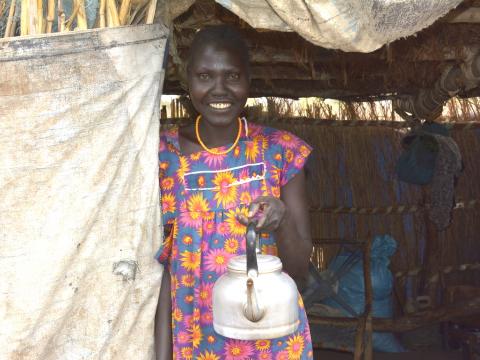Adeng’s tea business expands as BRACE II helps boost local economy

By Zipporah Karani, Communications Coordinator
All she needed was cooking utensils like saucepans and wooden chairs to make tea for her customers. Thirty-year old Adeng’s tea shop is made of thatched-roof hut. She serves tea alongside roasted groundnuts and kisra, a local delicacy in many of South Sudan’s communities.
But she is not contented with her small income. To support her five children’s needs after her husband died seven years ago, she has to expand and work hard. Diligently every month, she tries to save money from her income.

Her hard work earns her daily profit of SSP1,300 (USD5). When World Vision’s cash for assets program came last year in her village, she was excited. The support of SSP5,000 (USD40.5) she got was spent in getting a new kettle and six tea glasses for her customers.
“World Vision’s cash for assets program helps boost the local economy, improves income of families and enable them buy nutritious food to reduce hunger and prevent malnutrition”, says Kenneth Munyengerwi, Project Director for Building Resilience through Asset Creation and Enhancement (BRACE) Phase II. The project impacts the lives of 75,900 people in 12,650 households.
The BRACE II helped encourage Adeng by providing her cas assistance every month for six months and trained her how to run her business properly. She used to work in road construction and in the farm to support her children.
“The people participating in the program are taught skills and knowledge for sustainable livelihoods. Our aim is for them to have a hunger-free future“, Munyengerwi explains.
In partnership with Smile Again Africa Development Organization (SAADO) and Support For Peace and Education Development Programme (SPEDP), World Vision’s program covers communities in Aweil North, Gogrial West and Magwi counties in South Sudan.

Munyengerwi adds, “BRACE II focuses on disaster management and gives priority to women and empowers them with life skills to help improve their children well-being”, says Munyengerwi.
In the process, the program funded by the Department for International Development (DFID) also builds household and community resilience through building productive assets that are utilized to transform their lives and livelihoods such as multipurpose ponds, vegetable gardens and floods dykes.